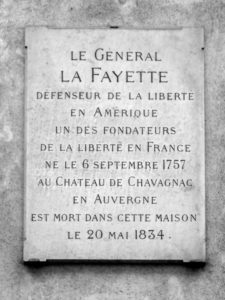
Lafayette lived the later years of his life, and ultimately died, in the building at 8, rue d’Anjou.
He was famous during his lifetime both in the US and France. The picture below shows the facade of this same building in 1889.

I guess the street numbers must have changed since then, but it’s encouraging to see that not much else has. The sketch is from 55 years after Lafayette’s death. The photograph of the plaque was taken in about 2010 — about 120 years after the sketch!
James Fenimore Cooper (yes, of Deerslayer fame) was in Paris when Lafayette lived here and described it in A Residence in France:
On quitting the Hôtel de l’Etat Major, after being dismissed so unceremoniously from the command of the National Guard, Lafayette returned to his own neat but simple lodgings in the Rue d’Anjou. The hotel, itself, is one of some pretensions, but his apartments, though quite sufficient for a single person, are not among the best it contains, lying on the street, which is rarely or never the case with the principal rooms. The passage to them communicates with the great staircase, and the door is one of those simple, retired entrances that, in Paris, so frequently open on the abodes of some of the most illustrious men of the age. Here have I seen princes, marshals, and dignitaries of all degrees, ringing for admission, no one appearing to think of aught but the great man within. These things are permitted here, where the mind gets accustomed to weigh in the balance all the different claims to distinction; but it would scarcely do in a country, in which the pursuit of money is the sole and engrossing concern of life; a show of expenditure becoming necessary to maintain it.
The apartments of Lafayette consist of a large ante-chamber, two salons, and an inner room, where he usually sits and writes, and in which, of late, he has had his bed. These rooms are en suite, and communicate, laterally, with one or two more, and the offices. His sole attendants in town, are the German valet, named Bastien, who accompanied him in his last visit to America, the footman who attends him with the carriage, and the coachman (there may be a cook, but I never saw a female in the apartments). Neither wears a livery, although all his appointments, carriages, horses, and furniture, are those of a gentleman. One thing has struck me as a little singular. Notwithstanding his strong attachment to America and to her usages, Lafayette, while the practice is getting to be common in Paris, has not adopted the use of carpets. I do not remember to have seen one, at La Grange, or in town.
When I show myself at the door, Bastien, who usually acts as porter, and who has become quite a diplomatist in these matters, makes a sign of assent, and intimates that the General is at dinner. Of late, he commonly dispenses with the ceremony of letting it be known who has come, but I am at once ushered into the bed-room. Here I find Lafayette seated at a table, just large enough to contain one cover and a single dish; or a table, in other words, so small as to be covered with a napkin. His little white lap-dog is his only companion. As it is always understood that I have dined, no ceremony is used, but I take a seat at the chimney corner, while he goes on with his dinner. His meals are quite frugal, though good; a poulet rôti invariably making one dish. There are two or three removes, a dish at a time, and the dinner usually concludes with some preserves or dried fruits, especially dates, of which he is extremely fond. I generally come in for one or two of the latter.